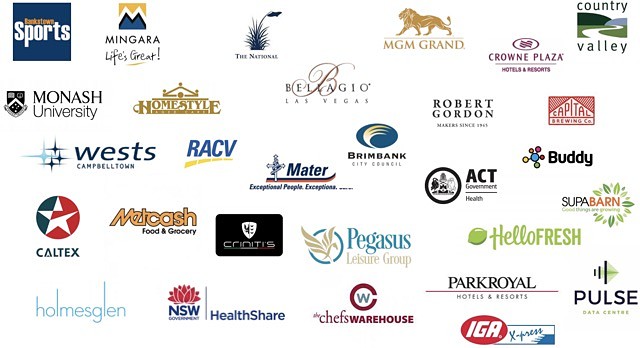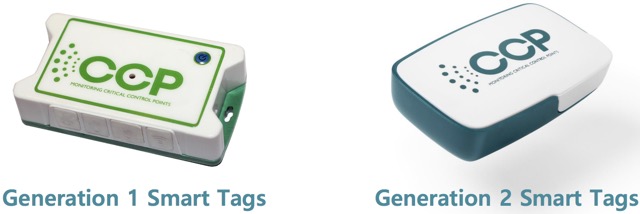CCP Technologies on track to establish firm IoT place in the global food chain

60% of food waste occurs through the supply chain, costing Australian businesses $20 billion annually.
Food industry Internet of Things (IoT) company CCP Technologies (ASX: CT1) has held its annual general meeting earlier this week, with its CEO Michael White declaring that the company has leveraged its growing market presence in providing IoT-enabled supply chain management, to be in a position to realise a “substantial pipeline of opportunities” in the foreseeable future.
In an address to the company’s shareholders and market analysts, Mr White laid out the company’s future that focuses on proactive rather reactive cold chain management and presented the company’s “Generation 2” platform that offers optimised monitoring and further advances in facilitating efficient storage of perishable food.
According to CCP, its pipeline includes 92 potential opportunities with a total contract value of $7.2 million and includes 66 advanced opportunities with a total contract value of $2.2 million.
CCP also confirmed that 67% of its impending deals refer to “large enterprise opportunities” that exceed $250,000 in contract value.

CCP Technologies’ customer base.
“We have completed our major hardware and software development program which has delivered one of the most advanced IoT Big Data Analytics Platforms available today,” said Mr White.
“We anticipate revenues and customer contract value to rise substantially over the next six months as trials with a number of large national and global companies are successfully concluded,” he said.
CCP has reportedly completed its “major development works” and now has a substantial pipeline of opportunities which is expected to put downward pressure on the company’s cash burn. CCP’s revenue has grown by more than five and a half times over the 12 months, which now stands at $156,000.

Mr White said that CCP is seeking to extend its reach to over 100 customers and monitoring more than 210 sites in Australia, the US and Singapore. Over the past month, CCP says it has received and managed almost 9 million data points – yet another record high that underlines its mission to establish a formidable position in supporting Australia’s food industry.
Improving storage of perishable food
According to market analysts, the food industry in Australia and further afield is now primed for an advanced IoT solution – a solution being offered by CCP Technologies to improve what’s known as supply chain management.
There is a growing need for businesses to monitor how their goods are being shipped worldwide, especially perishable food that typically requires stringent oversight and consistent quality control.
The food industry faces several key challenges given that around 30% of all food produced and supplied to the market is wasted. The less-than-desirable state of food distribution means that more than $20 billion worth of food is discarded every year in Australia alone.
Globally, the problem is even more daunting due to even less efficient monitoring of perishable food, compared to Australia’s relatively higher standard.
The result is that roughly one in five people suffer a case of food poisoning which costs the Australian economy over a billion dollars each year in related medical costs and indirect costs to employers.
Starting with refrigeration
The food industry is reliant on refrigeration which has quickly become a major factor in terms of being a major drain on electricity and other sources of energy.
Refrigeration accounts for up to 70% of the electricity consumed in an average grocery store or supermarket. The challenge for the food service and food retail sectors is to reduce power consumption whilst ensuring that food is held in these assets at optimal temperatures.
Against this backdrop of costs, inefficiencies and supply chain failures exists the potential for massive savings to be gained across all parts of the food supply chain, according to CCP Technologies.
The solution to wasted food
CCP Technologies has developed an award-winning smart sensor, or “low-cost IoT Smart Tags”, that can track and record a variety of environmental factors that allow perishable food to remain commercially-viable and thereby prevent huge amounts of food wastage.
CCP’s smart tags continuously sample critical control points such as temperature and humidity with the collated data assembled into “encrypted data packets” that can be transmitted across third-party networks to CCP’s cloud-capable analytics platform.
The platform incorporates advanced tools including predictive analytics and artificial intelligence (AI), interpreting the data and transforming it into valuable business intelligence. CCP’s clients are then notified in advance of “out of tolerance” events and likely failures and can view the analytics through dashboards and bespoke reports.
Furthermore, CCP says its tags are now fully integrated with mobile phones using near-field communication (NFC) and Bluetooth – the same technology used by mobile phones to allow payments in the retail sector. The tags transmit data across a variety of low power wide area networks such as ‘NB IoT’, ‘Cat M1’ and ‘Sigfox’ from virtually anywhere in the world.

For CCP, the commercial opportunity to proactively manage the supply chain lies in operating a software-as-a-service (SaaS) model that could ensure consistently growing recurring revenues.
As a possible sign of things to come, CCP recently secured a strategic investment from Penta Global which has led to the integration of its IoT smart tags into the Penta and IBM-Hyperledger Blockchains.
Mr White said that CCP has now created a working “farm to fork demonstration” for the perishable food supply chain.
CCP and Penta have also partnered with the University of Melbourne to incorporate biometrics and gas chromatography with machine learning to “close the loop” in the food chain from producer to end consumer.
“Our unique partnership will add quantitative shelf-life predictability as well as customer desirability ratings to the scope of CCP’s product offerings,” said Mr White.
The technology can be deployed to capture and manage “almost any type of data”, whether it be pH, temperature, GPS location, shock or humidity. The rationale is that the more data that is made available in real-time, the better the level of service CCP can offer directly to its customers.
Blockchain power
One of the brightest developments on the horizon for CCP is blockchain integration, given a large amount of data being recorded and managed in real-time.
The blockchain is expected to play an increasingly important role in the food industry as large food companies seek to improve supply chain visibility, integrity and efficiency.
In September of this year, US giant Walmart announced that all suppliers of leafy vegetables must be on the blockchain within the next 12 months if they intend to continue their supply contracts.
CCP expects this requirement will extend to other product lines and will become a requirement of other large food organisations in the near future.
In the meantime, CCP is progressing an opportunity to partner with a multinational professional services firm to supply refrigeration diagnostics to a global beverage firm seeking to remotely monitor more than 50,000 commercial fridges in Australia.
Additionally, through its partner Eposode Data Solutions, CCP has quoted its solution to monitor freezers and chillers for a large food service chain across more than 230 sites nationwide.
Its partnership with Koolmax and its recently-signed White Tiger joint-venture in the US is also supporting the implementation of CCP services in casinos.
There is also the potential for commerce in Asia.
CCP’s smart tags have recently been deployed to feed data into a blockchain to underpin smart contracts associated with air shipments of beef to southeast Asia. This trial is expected to lead to commercial deployment blockchain-powered technology.
